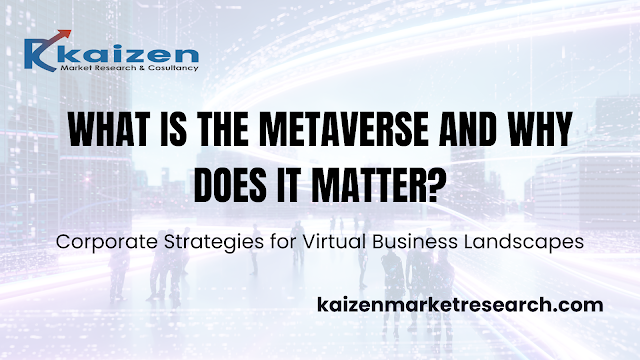Metaverse and Beyond: Corporate Strategies for Virtual Business Landscapes
The metaverse is no longer just a futuristic concept; it's an evolving digital frontier that promises to reshape the way businesses operate, interact with consumers, and innovate. With advancements in virtual reality (VR), augmented reality (AR), and blockchain technology, the metaverse is rapidly gaining traction, presenting new opportunities and challenges for businesses across various industries.
1. Building Virtual Brand Presence
The metaverse offers businesses the chance to establish an
immersive, virtual presence that transcends traditional physical storefronts. A
digital version of your brand can engage consumers in exciting ways.
- Virtual
Stores and Showrooms: Create interactive 3D environments where
customers can explore your products in a fully immersive setting.
- Branded
Virtual Real Estate: Some companies have already begun to invest in
virtual real estate within the metaverse, leasing space for digital
events, product launches, or experiences.
- Digital
Products and Services: The sale of virtual goods, NFTs, and branded
content is already a reality in the metaverse, providing an additional
revenue stream.
2. Engaging with Consumers in New Ways
The metaverse presents an entirely new avenue for businesses
to engage with consumers, offering an interactive, real-time experience that is
not possible in the physical world.
- Immersive
Experiences: Brands can host virtual events, product launches, or even
concerts to engage consumers in real-time.
- Customer
Interactions: Through avatars and virtual assistants, businesses can
engage with customers on a more personalized level, answering questions,
offering advice, and providing customer support.
- Gamification:
By integrating elements of gaming into their metaverse strategy, companies
can drive engagement and increase brand loyalty.
3. Expanding E-Commerce Opportunities
The metaverse has the potential to revolutionize e-commerce
by combining traditional online shopping with immersive, interactive
experiences.
- 3D
Shopping Environments: Virtual shopping experiences where consumers
can try on clothes, view products from every angle, or even interact with
other shoppers.
- Cryptocurrency
and Blockchain Payments: With the rise of blockchain and
cryptocurrency, businesses can tap into secure, decentralized payment
systems that are becoming increasingly popular within the metaverse.
- Digital
Product Integration: Many businesses, particularly in the fashion,
gaming, and entertainment sectors, are selling digital products like
skins, outfits, and collectibles.
4. Metaverse for Collaboration and Remote Work
The metaverse is also transforming the workplace by offering
new ways for employees to collaborate and work remotely in virtual spaces.
- Virtual
Offices: Companies are creating digital office spaces where employees
can meet in virtual rooms, attend meetings, and collaborate on projects
from anywhere in the world.
- Team
Building and Training: Virtual environments offer an interactive way
to conduct team-building exercises, training sessions, and even
simulations that would be hard to recreate in the real world.
- Work-Life
Balance: The ability to work in virtual environments may also help
improve work-life balance by allowing employees to work in more flexible
and less traditional environments.
5. Data Collection and Analytics
The metaverse generates vast amounts of data that can be
analyzed to gain valuable insights into consumer behavior, product performance,
and user interactions.
- Behavioral
Analytics: By tracking how users interact with products, services, and
virtual environments, businesses can gain deeper insights into consumer
preferences and trends.
- Personalization:
Leveraging this data, businesses can create more personalized experiences
for users, offering tailored products, services, or advertisements that
resonate with specific customer needs.
- Enhanced
Marketing Campaigns: Real-time data allows for more effective and
adaptive marketing campaigns, increasing the chances of customer
engagement and conversion.
6. Ethical Considerations and Sustainability
As businesses enter the metaverse, it's important to address
ethical and sustainability concerns related to digital consumption and data
privacy.
- Sustainability:
Virtual products and services can help reduce the environmental impact of
physical production and shipping. Businesses can explore eco-friendly
options for virtual product design and digital services.
- Data
Security: As businesses collect vast amounts of data in the metaverse,
protecting consumer privacy and ensuring data security is crucial for
building trust.
- Digital
Equity: Companies must consider accessibility and inclusivity to
ensure that the metaverse remains a space open to all consumers,
regardless of their physical location, financial resources, or technical
expertise.
7. Strategic Partnerships and Collaborations
To succeed in the metaverse, businesses need to form
strategic partnerships with technology providers, content creators, and other
businesses. Collaborations can help expand a company’s reach and tap into new
customer segments.
- Technology
Partners: Partnering with companies that specialize in VR, AR, and
blockchain technology can help businesses develop effective solutions for
their metaverse presence.
- Collaborating
with Influencers: Digital influencers in the metaverse can be valuable
partners for driving brand awareness and consumer engagement in virtual
spaces.
- Cross-Industry
Collaborations: Partnering with other businesses in the metaverse to
co-create events, campaigns, or digital products can help amplify the
impact and reach of your brand.
Conclusion
The metaverse offers immense potential for businesses that
are ready to adapt and innovate. By embracing this new virtual frontier,
companies can connect with consumers in novel ways, create immersive
experiences, and expand their revenue streams. However, success in the
metaverse requires careful planning, strategic investments, and a willingness
to embrace emerging technologies.
As the digital world continues to evolve, businesses that establish a strong presence in the metaverse will be well-positioned to capitalize on future growth. To understand how your company can effectively integrate metaverse strategies, get in touch with Kaizen Market Research and Consultancy.

